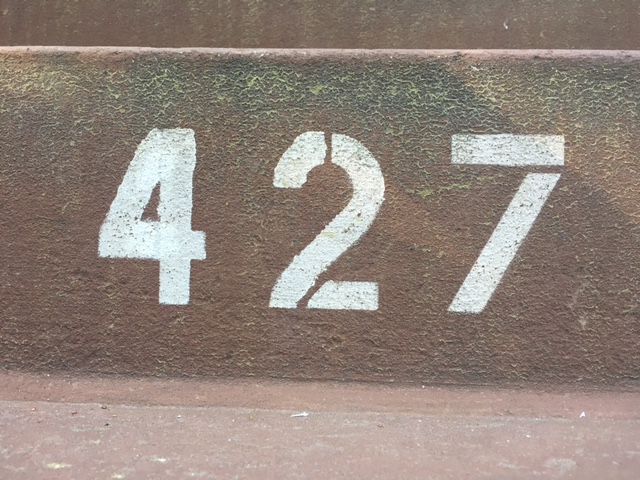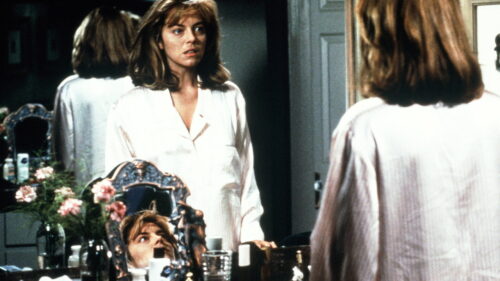My
wife Jennifer died April 27, 2006, at 35, of a heart attack brought on by
a defective valve that had somehow escaped doctors’ attention. My daughter was
eight years old. My son was two. I was a few months shy of my 38th
birthday. It feels like it happened last week, but it also feels like it
happened ten years ago. It’s never not happening.
This
is not another love letter to Jen. I’ve written a lot of those since 2006, the
best known of which you can read here. Nor is this a meditation on Jen and the
experience of losing Jen by way of criticizing somebody else’s art. Anybody
who’s read me for any length of time will tell you that I do that second thing
pretty regularly, in the course of reviewing films and TV programs, and of course,
when writing obituaries. Sometimes I mention her name, but most of the time
she’s an unremarked upon presence binding my words together and keeping the
tone on track. She always was my best editor.
No,
this is a different piece. It’s about the experience of being without Jen.
It
is not an advice piece. I would never offer advice on relationships or matters
of the heart. I just feel like it would be as trustworthy as
Inspector Clouseau’s advice on police work.
It’s a description of where I’ve been, and where I am today.

Every
now and then people ask me what the milestones were during the last decade,
or what I learned. I have email and phone conversations somewhat regularly with
people who know about this part of my biography and are experiencing some
version of it now and want to know more or less what they’re in for. I never
know what to tell them except that it was all a slow-motion blur, one situation
bleeding into another.
Things
were especially blurry in the years right after Jen died. I was basically a
drunk and a pothead for the first two years, but I was so careful about hiding
it that only a few people knew how bad it was. It was so bad that one time I
just took off for two weeks and visited three cities, got blackout drunk and
woke up in a hotel in a fourth city, San Francisco, in a room overlooking the
bay, with no memory of having bought a plane ticket or booked a room there.
Then
there was an approximately two-month stretch where I’d leave my kids with
friends or family members, get drunk in bars and wander around Brooklyn trying
to provoke fistfights with strangers—a suicide wish, to be sure, or maybe just a
wish to at least be convicted of assault and go to jail and be taken out of my
family’s ongoing story, a drama in which I felt like a miscast actor who
couldn’t remember his lines anyway, so what was the point of even being
onstage?
I
used to castigate myself about all the bad decisions I made during that period.
There
were a lot. I mean a lot.
I
had two newspaper jobs when Jen died, one full time and the other contract
freelance. But I felt embarrassed at my inability to produce at the same level
I had before, so I quit both of them. I could have gone on disability from the
staff job or taken a sabbatical from the freelance gig. There was no reason to
have just quit. It wasn’t helping anyone but the companies that employed
me—helping them save a few bucks. Dumb, dumb, dumb. I burned through the
insurance money and part of our savings. I sold a share in a condominium in
Disney World that Jen had saved up for, to pay for a Super 16mm short film
about my mental state about a year-and-a-half into the post-Jen era, a period
in which I was drinking several bottles of red wine a day and using sleeping
pills and caffeine pills to make myself go to sleep each night and be sure I woke
up in time to get my daughter off to school the next day. I think it’s pretty good—at least
it looks and sounds good, and has strong performances; I had professonal
collaborators—but in a rare burst of common sense, I decided I’d rather spend a
few thousand dollars on my children than get it scanned and
color-corrected. (The negative is in a plastic bin in a safety deposit box. I have
no idea where the sound files are. Somewhere, I hope.)
I
used to wish I could blame the profligate spending on a gambling problem, because at least then
I could tell people I knew where the money went. A lot of it went to child care
and rent and some more to misadventures like the ones listed above. But a lot more money just went poof.
All of this, too, is a blur.
When
I entered the dating world (way too soon, in retrospect—with exactly the
wrong person for a guy in my situation), I made a mess of things. I made more
messes over the years. Big messes. Burning tires/radiation/”This is a test of
the Emergency Broadcast System” messes.
I
used to beat myself up about all the terrible decisions I made—wasting time on
relationships that were wrong for me and sabotaging ones that were
potentially quite good; pouring time and money into dream projects that were just extensions of therapy rather than work that might realistically
pay creative or monetary dividends; making rash decisions about where to work
or live.
I
don’t beat myself up about much anymore—at least not stuff related to the
aftermath of Jen. I did the best that I could under the circumstances. And
the mistakes I made are mistakes a lot of people make anyway, even when they
aren’t dealing with the loss of a mate.
Things
are better now, though. Altogether better.
I have two jobs again. I’ve written some books that did well. I have great, loyal friends. My brilliant, sardonic
daughter is in college now and seems to enjoy it. I have no idea what
she’ll end up doing with her life, but I am sure she’ll take it seriously
and be great at it. My son is in middle school and has become a decent guitarist
and a very good soccer player, and he dotes on his pet guinea pigs and his fish
and his cats (I call him Nature Boy). We’re about as well-adjusted as a family
can be after what we’ve been through.
I’ve gotten a lot tougher, and
I care a bit more about my finances, my credit rating, and stuff like whether
or not I will ever own a house—things I never gave a thought to before Jen
died because Jen always worried about that stuff (this is the case in a lot of
couples, I’ve found, and it’s not always gender-coded; one partner brings in
most of the money, the other manages the domestic sphere).
But
in other ways I’m the same person, with the same basic flaws and virtues that
relatives and old friends remember. I still do impossible things better than
most people while screwing up things that any fool ought to be able to do. I
still underestimate how much time it takes to do things. I am still scatterbrained,
I still forget things, I still procrastinate and get lost in my own head and
lose interest in things too quickly. I am still quick to anger, though I like
to think I do a better job of managing my temper, and thinking about what I am
about to say before I say it, and often deciding not to say anything after all
(you might or might not be surprised how often this is the correct strategy). I
still don’t take care of myself as well as I should, though at least I go to
the gym regularly and favor vegetables and salads and rarely eat fried foods or anything that’s cheesy or
greasy. I get somewhat more sleep than I used to. Somewhat. Vampire metabolism runs in my family so there’s only so much I can do about that.
But
I honestly don’t know if any of that stuff is the result of anything related to
losing Jen so much as an inevitable practical response to getting older.
There
are some changes that I feel pretty sure are directly related to the loss of
Jen.
I
listen better to people who are in pain. I don’t judge people as swiftly or
harshly as I used to, because I’ve made such a train wreck of so many professional
and romantic situations that I know I’m the last person who should be noting other
people’s failures. I try to make a point of being kind to people when they’ve
royally messed up, and trying to ask what’s going on in their personal lives
before offering criticism or a reprimand, because I’ve spent a fair amount of
time being called on the carpet for my own mistakes without anybody considering
that there were genuine extenuating circumstances, and I know how worthless
that can make a person feel.
But here, too, I don’t know how much of that is Jen-related and how much is just
getting older and better rather than older and worse. Maybe losing Jen accelerated the process. Or maybe it just caught me up to where people are supposed to be in their forties.
The
only thing I can say for sure is that when you give yourself permission to just
live—to fall apart when you need to, to feel whatever you’re feeling, to make
mistakes and own them, to forgive yourself for what’s recognizably human, to
make amends for egregious behavior to the extent that such a thing is possible,
to let bad moments and bad days roll off your back instead of masochistically
marinating in them—you get through it all with your sanity intact.
This
was a very hard lesson to learn.
I’m still learning it.
But
that’s a big lesson. It’s an umbrella that covers a lot. It boils down to:
Be
OK with yourself. Know
that you’re handling things as well as they can be handled. Know that you’re
not being punished, even though it might feel that way. That you didn’t “deserve” it.
You didn’t do anything wrong. Your mate didn’t do anything wrong. It wasn’t the
heart attack, the cancer, the diet, the car wreck, the whatever. It was just
something that happened.
I’ve
never gotten myself into worse trouble, or felt worse about myself, or inflicted more
suffering on my family and friends, than when I tried to force life to fit a
particular template. I’m a writer by trade, so of course it was inevitable that
I’d been thinking about the narrative of my life during the first few years and
making decisions that would put a happy ending on my story: Find
a mother for these kids, you’ll have a happy ending. Break up with her. Get
back together with her. Rinse, repeat. Happy ending. Give
up on trying to find a mother for these kids, they don’t need a mother, they
already have you. That’ll get you closer to that happy ending. Say
yes to this job or no to that other job, happy ending. Take a teaching gig in
Long Island. Go back to school and get a degree in counseling and quit
journalism and spend time talking to at-risk youth. Happy ending. Move to Dallas. Move to
Austin. Move to Los Angeles. Move to Switzerland. And he lived happily ever after. Be a critic. Be a novelist.
Be a filmmaker. Move in with your dad and raise your kids from one of his spare
bedrooms. Fade to black, roll credits.
Whatever
it takes to get to that happy ending.
Whatever it takes.
Well,
life is not a story. It’s a series of events that happens to you, and if you’re
lucky, that sometimes you make happen. There is not a lot of rhyme or reason in
the order. Luck is the residue of design but sometimes it’s just luck. There
are symbols everywhere. Life is constantly handing you metaphors. (One breakup
occurred during what was supposed to be a romantic overnight stay in a hotel;
we had a fight at the bar and on the way back to the room, we found a fork in
the middle of the hallway. A fork.)
You can rearrange the signs and symbols and events to tell any story you want,
but only in retrospect. (You better believe I’ll use that fork someday.)
But
what you can’t do is will a happy ending into existence.
If you are trying to
do that, it’s probably fated not to happen, because it’s not coming out of
the moment you are in and it’s not natural. It’s an attempt to impose control
on that which cannot be controlled.
I
keep learning this lesson again and again. The only thing that’s changed in the
last decade is the speed with which I catch myself making that same damned fundamental
mistake—trying to write the story of my progress through the world—and then pull myself
out of it before the damage becomes too great.
Let
me give you another example: the observance of April 27.
Friends
have said, This must be a hard week for
you, or The tenth anniversary must be
especially difficult. That’s nice of them. I appreciate it.
But
I honestly can’t say that it is that difficult anymore. I’ve stopped trying to
control the day, plan the day, force the day to have meaning. And now the day
is usually rather pleasant—the kind of low-stress, intimate day that Jen used
to enjoy.
This
was not always the case.

On April 27, 2007, I
sat the office chair in our bedroom at the time that Jen was pronounced
dead—6:15 p.m. or thereabouts, according to the coroner; though who could say
for sure since, according to a doctor on the scene, she was very likely a goner
when they wheeled her into the hospital? I even did a Google search for
registered nurse training, which is what was up on the computer screen at the
moment of her death. (She wanted to become an emergency room nurse, because she
was an unflappable person who thrived during crises; everybody said so.) I was
trying to re-create the conditions. I thought maybe a chill wind or some kind
of electrical current would pass through me, that I’d feel her spirit flowing
through me like The Force and commune with her.
I
didn’t. It was just me sitting in a chair with the door closed.
I’d
felt odd, even eerie sensations at other times—things that absolutely felt
supernatural or uncanny; but never when I expected them, and never when I tried
to summon them. I don’t know why I thought this time would be different. I
sat there for about twenty more minutes while on the other side of the door, my
son James, who was 3, and my daughter Hannah, who was 9, sang Disney karaoke.
Finally James knocked on the door and said, “Bare sessities,” which is how he
requested “The Bare Necessities” from “The Jungle Book,” and I went out and
sang it for them.
I felt grateful and centered after that, but also a bit
embarrassed, because obviously singing “The Bare Necessities” with my kids was the best way to commemorate Jen, and how could I not have realized that? I almost missed that moment because I was sitting on the other side of a closed door trying to make something astonishing happen.
I tried to make a practice of not overthinking the anniversary, but it wasn’t until the fourth anniversary that I took a major leap forward. The day fell during Ebert Fest. Roger and Chaz had invited me to participate in a panel. I discussed it with my daughter over lunch one Saturday. I said, “I want to go, but I feel guilty not being there with you on the day, and it wouldn’t really be appropriate to bring you with me, since it’s not the sort of place where I can be with you kids all the time.”
She said, “Dad, I understand why you feel that way, but I feel like at some point, it’s going to have to be another day. And it might as well be now.”
She was 12. And she was right. Her mother would have been proud of her.
Still, I backslide. This
year I felt like I should do some special piece, something clever, something
with real ambition—a monument to Jen and the art that inspired both of us, or
something. The closer I got to the day the more I resisted getting started. A
couple of weeks ago, I realized I was doing it again—trying to shape the
narrative of my life, and give numbers and calendar pages power over me,
instead of just living my life and letting the world speak to me and through
me.
Again,
as is so often the case, as soon as I let go, things started to happen,
seemingly at random—and they all helped me process the loss and feel the
weight of the passage of time. The signs were there, the symbols were there.
They didn’t “mean” anything in any conventional Fiction 101 sense. They were
just there, like shapes in clouds.
At
Ebert Fest 2016, I saw two films that felt like commentaries on life without
Jen. One was Michael and Mark Polish’s film “Northfork,” a 1950s
fantasy-parable about a group of government agents trying to convince
homeowners to leave a valley that’s about to be flooded. The other was Brian
DePalma’s film “Blow Out,” a thriller about a sound man embroiled in a
political conspiracy. “Northfork” is mainly about death and transformation and
letting go (there’s even a monologue to that effect at the end) while the
climax of “Blow Out” finds the hero rushing across town to try to save his girl
and failing (which is kind of what happened to me on April 27, when I got news
of Jen’s collapse in Newark and rushed home to be with her in Brooklyn). I was
also asked to moderate a panel on “Six Feet Under,” the HBO series about a
family of undertakers; specifically, I spoke with Alan Ball while the final
episode of the series was screened on a wall behind us, composing a spontaneous
commentary track. That episode, as you have probably heard, jumps forward into
the future to show the exact circumstances of every character’s death.
All
these experiences helped me make sense of the impending anniversary and the
time that led to it.
I’m
open to all this now. I don’t overthink it like I used to. I accept it emotionally and intellectually but I don’t freight it with more meaning than it can handle.
I accept it as part of the natural order of things, more evidence of how your
life is always writing itself without your asking it to.
I
am in the process of moving into a new apartment. I signed the lease over a
month ago. It was only yesterday, as I was carrying a box of books up the front
steps, that I realized the address was 427.
I
stared at those numbers and laughed. Of course! How odd. How wonderful.

Even
more helpful were all the conversations I had with friends and family about
Jen, how magnificent Jen was, how much she meant to all of us, and how, all
things considered, my kids and I had gotten through the past decade in pretty good
shape.
I
used to bristle when people said, “Jen would be proud of you,” because all I
could think about was the mistakes I’d made, the roads I hadn’t taken,
and how inferior I thought I was at parenting compared to Jen, who was casually magnificent at it.
I don’t bristle anymore. I just say “Thank you.”
I’m OK. The
kids are OK. I enjoy life. I don’t want to die anymore. I want to live.
I
think about the future. I think about all the pieces I haven’t written yet. The
books I haven’t written yet. The films I might make someday.
I
think about the amazing things my kids are going to do one day, and the good
people that they already are.
The
biggest change of all is this: I’ve quit apologizing for still being madly in
love with Jen, casually dropping mentions of her into conversations, quoting her
at random.
I used to worry that this kind of thing made people uncomfortable,
or that it obligated me to tell the whole epic-tragic back-story, or that it
somehow reflected poorly on me in a culture that keeps whispering “move on,
move on, move on” into our ears. I don’t concern myself with any of that
anymore.
I feel like I don’t have to apologize for that, I don’t have to explain
it. It’s part of who I am.
More
than that: it’s the thing I’m proudest of.
Jen
was the total package. Hardworking, ethical, funny, sexy, a great mother,
a great wife, a great friend. The kind of person you wanted in your corner
during bad times as well as good. Many men (and a few women)
told me later, “You got the girl I always wanted.” This sentiment wasn’t just
about her beauty or her laid back charisma. It was a statement about her
greatness.
Jen
was a great person. And for almost seventeen years, I got to be her partner.
How
amazing is that?












